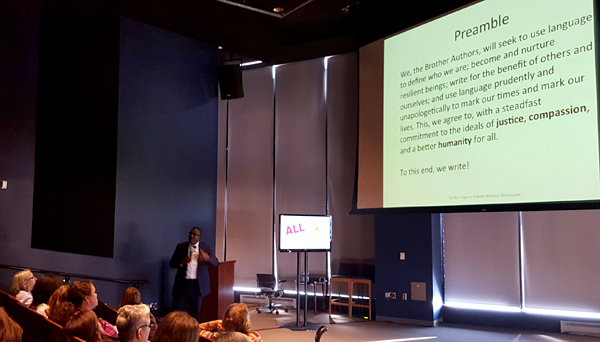2018 School Spending Survey Report
NYC DOE Conference: Reaching Diverse Learners
“Libraries for ALL Learners” was this year’s theme at the New York City Department of Education’s Library Services Annual Fall Conference, which convened at CitiField in Flushing. The session encompassed diversity in culture, ability, learning styles, gender and sexual identity.

Dr. Alfred W. Tatum leads a presentation
He criticized recent educational movements that encourage schools to assign excerpts instead of full texts. Neglecting to expose students to rich, flavorful texts in their entirety is “…state sanctioned failure…” that can lead to “state sanctioned violence.” he said. If we fail to connect students to the texts that build their literary lineage, “…we could surrender kids’ life choices before they get to their life chances.” Librarians received complimentary copies of Tatum’s book, Reading for their Life: Rebuilding the Textual Lineages of African-American Males (Heinemann, 2009). Brian Lorenzen, a middle school librarian in Flatbush, Brooklyn, said that Tatum’s talk helped him see recreational reading as a serious endeavor. Reflecting on his own textual lineage, which included The Hobbit by Tolkien and The Martian Chronicles by Ray Bradbury, Lorenzen realized that these texts shaped not only his personality, but also his morality. “The thought that my students might be missing that influence in their lives is distressing,” he said. “I've been thinking about how much of an impact I can have…”
Librarians convened at CitiField stadium, home of the New York Mets.
Valarie Hunsinger, K-8 librarian at Hyde Leadership Charter School in the South Bronx, led a session called “School Librarians as Equity Warriors” that focused on libraries’ ability to fill “educational, resource and opportunity gaps.” Another session by Sara Lissa Paulson helped librarians assess their cultural competence, and analyze how well their libraries and programming reflect the diversity within their schools. One attendee of Paulson’s session, librarian Jennifer Plassman, said that she sat beside two librarians who both work with an 80–90 percent Hispanic population, as she does at the EBC High School for Public Services in Brooklyn (one of two schools she serves; she also works part-time at PS. 9 in Manhattan). They shared tips about finding books that “feature Hispanic characters but are not specifically about the Hispanic experience but are instead…romances, mysteries, and science fiction.” Similarly, in a three-person author/illustrator panel, “The Lens of Diversity: It is Not All in What You See,” Daniel José Older spoke about his YA novel, Shadowshaper (Arthur Levine, 2015), a fantasy and zombie story starring Puerto Rican characters in Brooklyn. Older said he loved "Harry Potter" and other fantasy books, but as a person of color, he couldn’t see himself in the characters. “How do you love a genre that doesn’t love you back?” he asked. “Can we have diversity in fantasy?” Older also openly critiqued the book A Fine Dessert (Swartz & Wade, 2015), illustrated by his co-panelist Sophie Blackall, and authored by Emily Jenkins. Like other readers, Older expressed outrage at the book’s depictions of slaves as sanguine and content. Although author Jenkins published an apology for the book, illustrator Blackall defended her choices and intention as an illustrator. The idea that Blackall might be condoning slavery is “abhorrent,” to her, she said, sharing sadness at readers’ responses. The third panelist, Sean Qualls, co–illustrator with Selina Alko of The Case for Loving (Scholastic, 2015), shared his view that A Fine Dessert was not objectionable in its depiction of African-American history. He believed the book was more about dessert and motherhood than the horrors of slavery. He shared his own experience of depicting a slave woman’s smile at a “transcendent” moment when she met the love of her life, and how some of his readers found it offensive.
Sean Qualls and Sophie Blackall chat with librarians.
Blackall noted that there was “no consensus” and “coexisting different views” about her book, and said she hoped libraries would carry “…many, many books on slavery,” and that no single book could be expected to represent the experience. Despite some gestures of support and solidarity between Blackall and Older, the tension between them was palpable. Paula Zamora, elementary librarian and Diversity Initiative co-coordinator at the Churchill School in Manhattan, said she admired Older’s openness. “No one wants to offend or be confrontational,” she said, but we never make progress if we tiptoe around issues. Other sessions touched on students with learning and behavior issues. Lynda Mallaly Hunt’s talk focused on her life as a child, author and former teacher. She spoke about the real-life inspiration for her middle grade novel Fish in a Tree (Nancy Paulsen, 2015), about a girl who misbehaves in school to hide her inability to read, and the teacher who helps her find success. She gave concrete examples of how teachers might reach students like her. Some methods included handing a student a book and saying, “I think you can [read this] and I want you to try,” and letting students know that certain books reminded her of them. Her own textual lineage included The Cay by Theodore Taylor (Doubleday, 1969) and Tales of a Fourth Grade Nothing by Judy Blume (Dutton, 1972). These books, introduced to her the teacher to whom she pays tribute in Fish, transformed her from a non-reader to a reader. Jacqueline Woodson, National Book Award-winning author of the memoir Brown Girl Dreaming (Penguin, 2014), and prolific, celebrated author of children’s and YA books, shared stories of her own troubles in school. Teachers found Woodson exasperating because she read slowly, she said, but reading and re-reading books gave her a profound understanding. Her obsessive rereading of Hans Christian Anderson’s The Little Match Girl taught her about compassion, leading her to write Each Kindness (Nancy Paulsen, 2012), about a girl who misses the opportunity to be kind to an isolated student named Maya who wears hand-me-downs. Woodson seemed to identify with the character Maya’s marginalization. School improved, however, when teachers recognized her love of writing and gave her extra writing time as an incentive for completing other tasks. The experience of being seen and understood by teachers was empowering, she said. Librarians and educators can “set the tone” for kindness and acceptance by asking children for their preferred gender pronoun, and not assuming all families have a mother and father, said Woodson. We build trust when we don’t assume anything, and allow students to be “themselves in the world,” she said. She urged librarians to reach out to all students, especially those whose personalities may be initially puzzling or hard to read, and identify their unique talents. “The work to be done is the work of finding all of us,” said Woodson. “It’s about someone looking into our eyes…and leading us on our way.” Jess deCourcy Hinds is the library director of Bard High School Early College Queens and a freelance writer. Learn more at jessdecourcyhinds.com.RELATED
RECOMMENDED
CAREERS
The job outlook in 2030: Librarians will be in demand
CAREERS
The job outlook in 2030: Librarians will be in demand
ALREADY A SUBSCRIBER? LOG IN
We are currently offering this content for free. Sign up now to activate your personal profile, where you can save articles for future viewing






Add Comment :-
Be the first reader to comment.
Comment Policy:
Comment should not be empty !!!